
Vor ein paar Wochen haben wir einen Bericht über das neueste Album von Methadone Skies, Different Layers Of Fear, veröffentlicht. Es überzeugte durch einen coolen Mix verschiedener Stilrichtungen und eine sehr dichte und emotionale Konzeption. Nach einigen Mails mit der Band ergab sich aus einem netten Kontakt heraus die Möglichkeit, ein wenig mehr zu erfahren über eine junge, aufbrechende Band aus Rumänien, die es verdienen würde, auch auf den westeuropäischen Bühnen Beachtung zu finden. Also, willkommen bei kreativen Köpfen aus dem Reich der dunklen Wälder.
RockTimes: Hallo Leute, ich freue mich, endlich mal wieder etwas von Musikern aus Timisoara zu hören, wo auch meine alten Freunde von The :Egocentrics zuhause sind.
MS: Hallo, ja genau, die Jungs von The :Egocentrics kennen wir. Einige unserer ersten Stoner/Psychedelic-Konzerte, die wir besucht haben, waren ihre. Davon abgesehen haben wir unser erstes Konzert als Methadone Skies als Support auf der Release-Party für das Album "Love, Fear, Choices & Astronauts" der Egos hier in Timisoara gespielt.
RockTimes: Würdet Ihr sagen, dass die Musik der Egos Euch beeinflusst hat? Der erste Teil von "Where Were You When We Were Into The Void?" scheint mir fast wie eine mögliche Fortsetzung von "Center Of the Cyclone" – eine echte Beziehungskiste in Timisoara?
MS: Ja, die Jungs haben uns von Anfang an beeinflusst, wir waren ihre Fans und haben auch recht viel Zeit mit ihnen verbracht. Interessante Feststellung, denn wir haben überhaupt nicht an eine solche Ähnlichkeit gedacht, als wir den Song geschrieben und eingespielt haben.
RockTimes: Fühlt Ihr Euch als ein Teil der Stoner/Psychedelic-Szene oder mehr dem Postrock/Metal verbunden oder juckt Euch so eine Klassifizierung gar nicht?
MS: Echt, das interessiert uns überhaupt nicht. Wie auch immer, die Grundlage unserer Musik ist eine Mischung aus Psychedelic, Stoner Rock und Metal. In diesem Bereich sind wir als Band sozusagen aufgewachsen und dort haben wir unsere Fans gefunden. Wir haben uns allerdings musikalisch verändert und verzweigt, weil wir uns nicht ständig wiederholen wollen und weil wir alle unseren Musikgeschmack in den letzten Jahren weiterentwickelt haben.
RockTimes: Der Album-Titel lautet "Different Layers Of Fear". Welche Idee steckt dahinter?
MS: Die Titel für das Album und die einzelnen Songs kommen bei uns gewöhnlich zum Schluss, weil wir sehr lange brauchen, um uns für die richtigen zu entscheiden. Wir hatten eine Liste mit möglichen Album-Titeln, mit der wir monatelang herumhantiert haben, ohne uns auf einen Titel einigen zu können. Eines Tages stolperten wir über die großartigen Portraitbilder von Andrzej Dybowski, die er für das (übrigens sehr coole) Computerspiel "Layers Of Fear" gemalt hatte. Wir waren uns sofort einig, dass "Different Layers Of Fear" (die unterschiedlichen Schichten der Angst) interessant klingt und den Inhalt unserer Musik nicht verrät.
Obwohl die Titelnamen bereits ausgewählt worden waren, kann man einige davon letztendlich mit dem Namen des Albums verbinden. Außerdem hat Davide Straccione (von Zippo, Shores Of Null) einige der Texte, die er über "A Glitch In The Sun" schrieb, auf den Titel gestützt, was dazu beigetragen hat, ihm mehr Bedeutung und Tiefe zu verleihen.
RockTimes: Im zweiten Song, "God Help Us All", beginnt die Musik mit einer doomig, bedrohlichen Stimmung und Räumen, entwickelt aber am Ende für mein Empfinden eine sehr emotionale und irgendwie euphorische Atmosphäre, was vielleicht im Widerspruch zum Titel steht. Bin ich ein bisschen verrückt, wenn mich dieser Teil des Songs so positiv berührt.
MS: Ja, genau diesen Kontrast haben wir gewollt. Wir hatten den ersten Teil des Songs bereits entwickelt und dachten uns, dass am Ende etwas deutlich Positives und Entspanntes folgen müsste. Die Keyboards fügten dann auch eine 'ganzheitliche' Ebene hinzu, die zum epischen, glorreichen Finale des Stücks beitrug. Dieses Stück spielen wir besonders gern und es wirkt auf der Bühne auch sehr heftig und tief auf uns ein.
RockTimes: War es der Plan, dass der erste und letzte Song wie eine Klammer über das Album zusammenzuhängen scheinen?
MS: 'Manos' war schon seit einem Jahr fertig. "Where Were You When We Were Into The Void?" und eben der letztgenannte Song waren ursprünglich als Intro konzipiert. Wir wollten ein 2-3-minütiges Stückchen, um die LP zu eröffnen, aber ohne es zu merken, endete es letztlich doppelt so lang. Beide Songs fassen ziemlich gut zusammen, worum es in "DLoF" geht, also kann man sagen, dass sie zusammengehören.
RockTimes: Mir scheint es, dass rumänische Rockbands oftmals sehr abwechslungsreich zwischen den Stilarten unterwegs sind – die Egos haben das gemacht und auch eine Band namens Byron, die ich erst kürzlich zur Rezensierung im Fokus hatte. Und The Transylvanian Phoenix waren eine der ersten Bands, die Prog und Folk zusammenführten, lange bevor bekannte englische Bands dies taten. Auch Ihr spielt ja irgendwo zwischen den Genres Psyche, Stoner, Post Rock oder Metal. Ein typisches Merkmal für rumänische Rockmusik?
MS: Hier in Timisoara gab es immer eine eklektische Mischung von Stilen, die von Bands gespielt wurden und die Vielfalt selbst macht die Dinge interessanter. Derzeit glauben wir, dass die rumänische Underground-Szene einige spannende Veränderungen durchläuft und neue Sounds und stilistische Vermischungen aufkommen. Das ist großartig für uns, aber im Moment kriegt nur ein kleiner Teil des Publikums das wirklich mit. So viele Menschen hören immer noch nur die Musik, mit der sie aufgewachsen sind und interessieren sich nicht für neue Gruppen oder gehen aus Neugier zu einem ihrer Konzerte. Zusammenfassend lässt sich sagen, dass wir in Bezug auf Stile flexibel sind. Leider werden diese Änderungen jedoch durch das mangelnde Interesse der lokalen Öffentlichkeit und der Booker gebremst.
RockTimes: Wie schwierig ist es für eine rumänische Band, in die europäische Szene einzudringen? Wäre es nicht viel einfacher für Euch, wenn Ihr Eure Basis irgendwo in Holland, Belgien oder Deutschland hättet?
MS: Ja, es ist ein bisschen schwierig, das hören wir auch immer wieder mal von Leuten, die uns im Ausland gesehen und unsere Musik genossen haben. Viele waren allein deshalb überrascht, weil wir eben aus Rumänien stammen, hahaha. Dies liegt wahrscheinlich daran, dass nur wenige hiesige Bands außerhalb Rumäniens spielen, weil sie der Meinung sind, dass es sich nicht lohnt (tatsächlich der größte Fehler, den man machen kann). Daher ist eine große Mehrheit der Menschen in Mittel- / Westeuropa nicht daran gewöhnt, rumänische Bands zu sehen/hören. Es gibt hier eine ganze Reihe großartiger Acts, aber wir müssen uns dem Publikum in anderen Bereichen beweisen. Dies ist wahrscheinlich der Grund, warum wir von Presse, Labels, Bookern usw. oft ignoriert werden.
RockTimes Lasst uns darüber sprechen, wie Ihr Eure Songs schreibt. Wenn Ihr eine Idee für einen Song entwickelt, geht das von einem bestimmten Instrument aus? Progger Neal Morse hat erzählt, dass eines seiner letzten Alben komplett mit den Drumlines gestartet wurde und die übrigen Instrumente erst später darüber entwickelt wurden.
MS: Die meisten unserer Songs entstehen aus Jams. Wir spielen, worauf wir Lust haben, und wenn uns etwas zusagt, nehmen wir eine Demo auf und kommen später darauf zurück. Manchmal dauert es Wochen, um sich auf einige Ideen zu einigen, manchmal beenden wir einen Track in ein paar Tagen. Von dem neuen Album basierte nur der erste Teil von "Focus" mehr oder weniger auf den Gitarrenparts, aber die zweite Hälfte war ein zufälliger Jam, den wir eingespielt haben, als wir versuchten, einen guten Weg zu finden, den Song zu beenden.
RockTimes Wenn Ihr eine Platte aufnehmt, wie vorbereitet seid Ihr dann? Sind die Kompositionen bereits fertig? Wie viel Improvisation fließt in den Aufnahmeprozess ein?
MS: Aus zeitlichen und finanziellen Gründen haben wir beim Betreten des Studios normalerweise alles geplant und im Gepäck. Wir verbringen ungefähr zwei Wochen damit, die Haupttitel vorzubereiten und aufzunehmen, um später für Overdubs zurückzukehren. Zeitweise kamen kleinere Änderungen oder ungeplante Overdubs hinzu (zum Beispiel die Mandola und Saz auf "Mirra" vom Album "Eclectic Electric" oder der ausgeflippte Mittelteil des Titeltracks von "Colosseus" wurden im Studio entwickelt). "Ruse" auch von "Colosseus" machte einige größere Änderungen durch, da der Studio-Ingenieur (Edmond Karban von Dordeduh, Sunset In The 12th House) einige Keyboard-Ideen hatte und die Melodie ein wenig anders arrangierte.
RockTimes: Gibt es spezielle Orte oder Festivals, wo Ihr gerne mal spielen würdet.
MS: Es gibt einige Festivals, wo wir liebend gerne mal spielen würden, beispielsweise das Desertfest, Duna Jam, Up In Smoke oder Freak Valley, aber bislang hatten wir nie eine Chance, dort aufzutreten. Wollen wir hoffen, dass eines Tages einer der Booker über unsere Musik stolpert und uns dort spielen sehen möchte, hahahaha.
RockTimes: Zuletzt müssen wir noch über Fußball reden, hahaha. In einer unserer Mails hast Du, Raul, erwähnt, dass Ihr Euch auch über den Sieg von Liverpool in der Champions League gefreut habt.
Ist Fußball für Euch wichtig? Wo sind all die tollen rumänischen Spieler wie Marcel Raducanu oder Gheorge Hagi geblieben?
MS: Ja, wir sind Fußballfans, jeder von uns hat seinen eigenen Lieblingsverein. Unglücklicherweise ist es sowohl mit der rumänischen Liga als auch der Nationalmannschaft Jahr für Jahr bergab gegangen. Immerhin, unsere U 21 Nationalmannschaft (Hagis Sohn spielt dort) hat bei der kürzlich gespielten Euro alle überrascht und das Halbfinale erreicht, dort aber leider gegen Deutschland verloren. Hoffentlich schaffen die Spieler den Sprung in die erste Mannschaft und lassen die guten Zeiten zurückkehren. Es wird allmählich öde, immer nur die anderen Länder bei Euros und Weltmeisterschaften zu sehen, hahaha.
RockTimes: Letzte Frage. Was sind Eure Pläne für die nähere Zukunft?
MS: Wir planen eine Tour, wenn unser eigener Zeitplan das erlaubt. Wir hoffen, mehr in Deutschland zu spielen und in Länder wie Griechenland, Holland, Frankreich oder die Schweiz zu kommen, wo wir noch nie aufgetreten sind. Wir hoffen dann auch mit neuem Material aufzuwarten, auf dass es nicht wieder drei Jahre dauern möge, bis unser neues Album erscheint.
RockTimes Danke Leute für das nette Interview. Ich hoffe Euch bald mal auf einer deutschen Bühne sehen zu können!
Anmerkung der Redaktion: Genehmigung zur Veröffentlichung der Fotos liegt vor!
For the last few weeks I was e-mailing back and forth with Raul Stanciu of Methadone Skies; we presented their great new album Different Layers Of Fear early june in this magazine. Then I got the chance to talk to the guys about the new album, the band and their origins. So hey, let’s start right away.
RockTimes: Hey friends, good to talk to people from Timisoara again, where my friends The :Egocentrics are located as well. I think you know them, don’t you?
MS: Hello! Yes, we know The :Egocentrics. Some of the first stoner/psychedelic concerts we’ve been to together were theirs. Besides this, our first concert as Methadone Skies was an opening slot at their Love, Fear, Choices & Astronauts launch party here in Timisoara.
RockTimes: Would you say the music of the Egos did influence yours? I feel like the first part of "Where Were You When We Were Into The Void?" could have been a possible continuation of "Center Of The Cyclone" – are there any special relationships in Timisoara?
MS: Yes, they influenced us right from the beginning as we are fans and spent quite some time together over the years. Even so, it’s interesting, we haven’t thought of the similarities in sound while composing or recording that song!
RockTimes: Do you feel you’re a part of the stoner/psychedelic scene or do you see yourself more in the post rock/metal corner. Or doesn’t it matter to you at all if somebody classifies you to a special style?
MS: It doesn’t really matter to us. However, the foundation to our music is a blend of psychedelic and stoner rock and metal. As a band, we grew up and made fans in that scene. We started branching out though, because we didn’t want to repeat ourselves and we all changed our taste in music in the past years.
RockTimes: The album title is about "Different Layers Of Fear". What’s the idea behind that?
MS: Album and track titles usually come last, because it takes us so much time to decide on them. We had a list of possible album titles that we ran through for months without agreeing on any of them. One day we stumbled over the awesome main portrait paintings done by Andrzej Dybowski for the PC game Layers of Fear (which is a cool game, btw). We all agreed "Different Layers Of Fear" sounds interesting and doesn’t give away the content of the music.
Even though the track titles were already chosen, you can ultimately connect some of them to the album’s name. Plus, Davide Straccione (of Zippo, Shores of Null) based some of the lyrics he wrote on 'A Glitch in the Sun' on the title, which helped give more meaning and depth to it.
RockTimes: In the second song, "God Help Us All", the music starts in a doomy mood and there are repetitive guitar spaces. But in the end it changes into a very emotional and somehow euphoric and hopeful atmosphere, which is probably supposed to contradict the title of the song. Am I weird or crazy because this part touches me so positive?
MS: Yes, we wanted that contrast. We had the first part figured out and thought there should be something more positive or at least somewhat more relaxed to end it. The keyboards also added a "holistic" layer, adding to the tune’s epic, glorious finale. It’s one of our favorites to play from the new album, it’s very intense for us on stage too.
RockTimes: Was it part of the plan, that the first and last song seem to hold the album together, just like a clip?
MS: 'Manos' was finished almost a year before 'Where Were You When We Were Into The Void?' and the latter was conceived initially as an intro. We wanted a 2-3 minute ditty to open the LP, but without realizing, it ended up twice as long. Both of them sum up pretty well what DLoF is all about, so yeah, you can say they belong together.
RockTimes: It seems to me that romanian bands are often very flexible in styles – the Egos were, also a band called Byron, which I reviewed a few weeks ago and the Transsylvanian Phoenix was one of the first bands, that mixed prog and folk elements long before some famous english bands did. As mentioned, your music works between psyche, stoner and post rock. Is that a trademark of romanian music?
MS: Here in Timisoara there was always an eclectic mix of styles being played by bands and the diversity itself makes things more interesting. Currently, we believe the Romanian underground scene goes through some nice changes, welcoming new sounds and style mashups. This is great for us, however, at the moment, only a small part of the possible audience keeps up with it. So many people still listen to what they grew up with and don’t care about new groups or going to one of their gigs just out of curiosity. As a conclusion, we are flexible in styles, but unfortunately, these changes are somewhat stalled by a lack of interest from the local public and bookers.
RockTimes: How difficult is it for Romanian bands to become part of the european scene? Wouldn’t it be much easier if you had your headquarters in… say Holland, Belgium or Germany?
MS: It is a bit difficult, we have even been told this thing a couple of times by people who saw us live abroad and enjoyed our music. Many were surprised just by the idea that we’re from Romania haha. This happens probably due to the fact that few bands venture outside Romania to play, because they think it isn’t worth it (biggest mistake actually). So, a vast majority of people in Central/Western Europe aren’t accustomed to watching/listening to Romanian bands playing. There are quite a number of great acts here, but we have to prove ourselves to the audiences in other areas. This is probably why we’re often ignored by press, labels, bookers, etc.
RockTimes: Let’s talk about writing songs. When the idea to a song develops, does it start with a line or a riff of one special instrument? Progger Neal Morse once told me that one of his latest albums started with the drum line for the whole thing and all the other instruments were built around the drums later.
MS: Most of our songs are born out of jams. We play whatever we feel like at the respective moment and when something clicks for us, we record a demo and return to it later. Sometimes it takes weeks to agree on some ideas to work on, sometimes we finish a track in a few days. From the new album, only the first part of 'Focus' was more or less based on the guitar parts, but the second half was a random jam we came up with while trying to find a nice way to end the song.
RockTimes: When you start recording an album, how prepared are you? Is the songwriting already completely done? And how much improvisation takes part during the recording?
MS: Due to time and financial constraints, when we enter the studio we usually have everything mapped out. We spend about 2 weeks to prepare and record the main tracks and return later for overdubs. At times, minor changes or unplanned overdubs got added (for example, the mandola and saz on "Mirra" from "Eclectic Electric" or the freak-out, middle part of the title track from Colosseus were decided on spot). "Ruse" also from "Colosseus" went through some bigger changes, as the studio engineer (Edmond Karban of Dordeduh, Sunset in the 12th House) had some keyboard ideas in mind and rearranged the tune a bit.
RockTimes: Do you have a special venue or festival in mind where you would like to play most?
MS: There are several festivals we’d love to play such as Desertfest, Duna Jam, Up in Smoke or Freak Valley, but never had the chance to. Hopefully, one of the bookers will stumble upon our music and want to see us perform it there haha.
RockTimes: At last we have to talk about football, hahaha. In one of your mails you mentioned that you – just like me – hope Liverpool FC will succeed in the Champions League as well. Is football important to you? Where are the great romanian players like Marcel Raducanu or Gheorge Hagi these times?
MS: We are football fans, each of us has its own favorite team. Unfortunately, the Romanian league and national team went downhill with each passing year lately. Still, the national U21 team (Hagi’s son, Ianis plays in it) surprised everyone by reaching the semifinals in the UEFA Euro U21, but sadly, lost to Germany. Hopefully, they will join the adult national team and make things interesting again. We’re tired of watching only other countries play at Euros and World Cups haha.
RockTimes: Okay, last question: What are your plans for the near future?
MS: We plan on touring when our schedules permit. We hope to play more in Germany and reach countries such as Greece, Netherlands, France or Switzerland where we haven’t played yet. Meanwhile, we’ll hopefully come up with new songs, so it won’t take us another three years to release a new album.
RockTimes: Thanks guys, I really hope to see you live on stage in Germany soon!



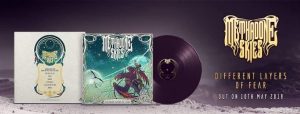
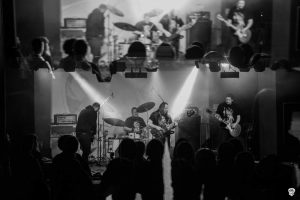
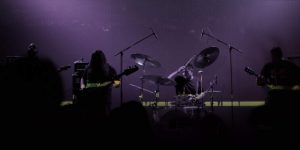
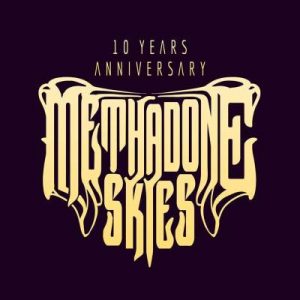
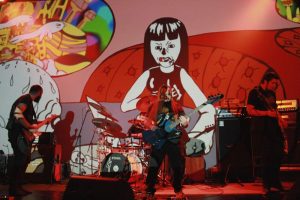

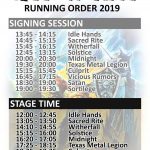
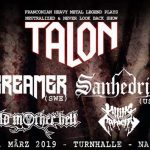

Neueste Kommentare